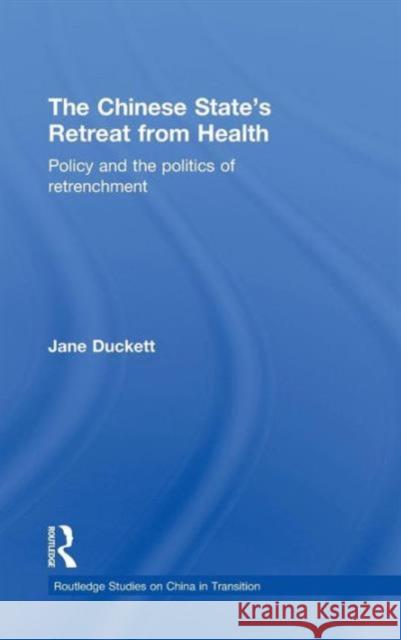The Chinese State's Retreat from Health: Policy and the Politics of Retrenchment » książka
The Chinese State's Retreat from Health: Policy and the Politics of Retrenchment
ISBN-13: 9780415573894 / Angielski / Twarda / 2010 / 160 str.
The Chinese State's Retreat from Health: Policy and the Politics of Retrenchment
ISBN-13: 9780415573894 / Angielski / Twarda / 2010 / 160 str.
(netto: 740,24 VAT: 5%)
Najniższa cena z 30 dni: 705,23
ok. 16-18 dni roboczych.
Darmowa dostawa!
Over the post-Mao period, the Chinese state has radically cut back its role in funding health services and insuring its citizens against the costs of ill health. Using an analytical framework drawn from studies of state retrenchment in industrialized democracies and in post-communist Eastern Europe, Jane Duckett argues that the state's retreat from health in China was not a simple consequence of economic policies and market reform. Just as important were the influences of health policies, reform era political institutions, communist party ideology, and bureaucratic stakeholders. Through her analysis, Duckett maintains that by studying retrenchment in China, the world's most populous nation and now a major global economic power, we can better understand international transformations in the role of the state, and the politics that shape that role. The Chinese State's Retreat from Health both extends research on retrenchment politics to a major authoritarian state and contributes to piecing together understanding of the Chinese state's changing role across the economy and other social policies, including housing and education. It will be of interest to students and scholars of Chinese politics, social policy and the Chinese health care system, as well as to those with a comparative interest in health, welfare states and the politics of retrenchment. Jane Duckett is Professor of Chinese and Comparative Politics at the University of Glasgow, UK.
Chinaâs health system has moved dramatically since the early 1980s from one with significant state involvement and public investment toward one that is partly privatised and highly commodified. This is now well-recognised, both outside China and within. Despite the attention paid to the health system and its problems, however, there has as yet been no focussed explanation of the massive retreat of the state from its role in health. Instead, changes to Chinaâs health system have been largely portrayed as either a by-product of economic policies or, in the few studies of health policy, as the result of rational, problem solving policy making.
The main aim of this book is a political analysis of the Chinese stateâs retreat from health in the post-Mao period. This is required in part because significantly cutting back state provision and allowing greater market allocation of health servicesâas has happened in Chinaâhas such enormous political consequences. Fundamentally, it reduces the stateâs allocation of resources having enormous redistributive consequences, reducing equality of access and putting health care beyond the reach of those with no ability to pay â potentially a matter of life and death.
A political analysis of the Chinese stateâs retreat from health may also help draw attention to the need for a wider understanding of its changing role domestically and in an international context. The stateâs role in the economy has also been much reduced, but the retreat is not confined to just health and the economy. It is part of a wider transformation that may include a range of arenas, notably housing and education. It is only by piecing together our understanding of these changes that we can come to a fuller understanding of post-Mao reforms, their political underpinnings, and what they mean for the Chinese state.











